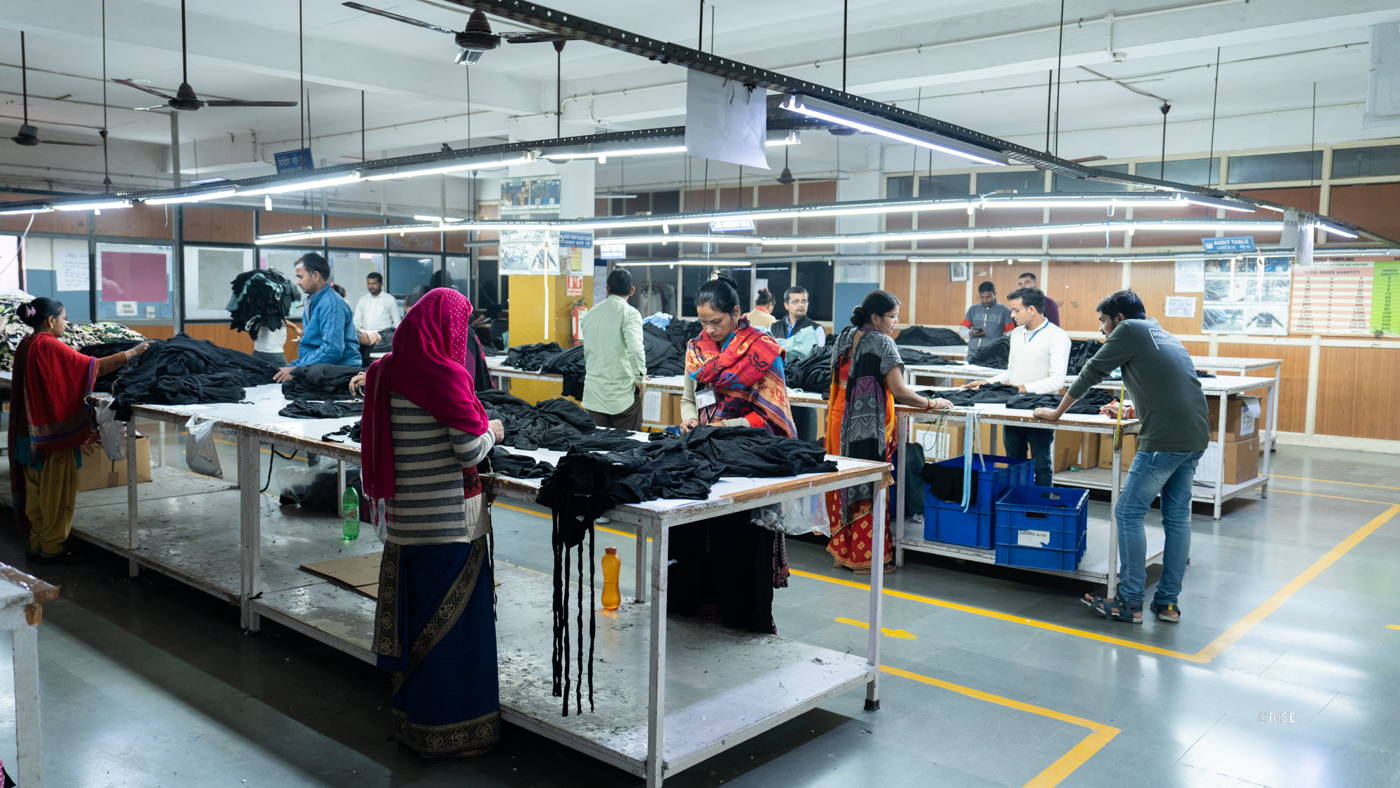
Key points:
- RISE and UN Women are partnering to address gender-based violence and harassment (GBVH) in the southern Indian state of Tamil Nadu.
- The partnership will include interventions on the factory floor and community programs to raise awareness and build institutional engagement.
- RISE members working in Tamil Nadu can join the partnership to adopt a comprehensive and sustainable model to address GBVH.
Starting in July 2024, RISE and UN Women are partnering in the southern Indian state of Tamil Nadu to address gender-based violence and harassment (GBVH) in the textile supply chain. With a three-pronged approach targeting factory workers, their communities and institutions, the two organizations aim to support garment, footwear and home textile brands and suppliers to broaden their GBVH interventions while avoiding program duplication.
- In factories, RISE will continue delivering its Respect program with support from local partners. The program offers a comprehensive approach for preventing and remediating GBVH. This includes training where workers and managers develop their understanding of gender and power dynamics and how these affect inter-personal During joint sessions, managers and workers get to develop a shared language about GBVH and agree on strategies for prevention and remediation. The program also supports factories in strengthening policies and mechanisms to prevent and remediate GBVH.
- In communities around factories, UN Women will deliver targeted programs, in collaboration with local NGOs, to address GBVH. The community interventions will build awareness on social norms and practices that perpetuate gender-based violence and encourage positive behavior change in the household, neighborhood, as well as at workplaces.
- With institutions, including governmental actors and unions, UN Women is going to draw on its convening powers to bring all stakeholders to the table and ensure GBVH remains high on the agenda. Through this engagement, UN Women and RISE are aiming to facilitate an enabling legislative and policy environment in line with Ending Violence against Women.
“Violence and harassment in global supply chains extend beyond workplace incidents. The broader concept of violence ‘in the world of work’ is a critical part of the ILO Convention C190,” says Christine Svarer, RISE’s Executive Director. “Our partnership with UN Women enables us to extend our impact beyond factories. Resolving gender-based violence and harassment in the workplace requires collaboration among industry stakeholders, women’s organizations and workers’ representatives. We are looking forward to leveraging our expertise and networks to scale up efforts and embed new ways of working, aiming for a future where no one in the garment industry fears harassment and violence at work.”
RISE uses a combination of intervention strategies to create a more harmonious and equitable work environment as a basis for addressing GBVH in factories. Over 23,000 workers - men and women - have already participated in RISE Respect program in India. After completing the training, participants report increased self-confidence levels and the communication skills needed to have assertive and constructive discussions at work and at home. They are better equipped to understand what constitutes GBVH and to support colleagues who have encountered it.
The partnership with UN Women is going to raise awareness and empower workers to speak up about workplace harassment and access available services both in and outside factories, thereby creating an enabling environment.
“UN Women India’s Women Empowerment for Textiles (WEFT) coalition works on multiple levels—institutional, community, and industry—to address gender-based violence and harassment (GBVH) among garment workers in Tamil Nadu and deliver on its mandate of zero tolerance. We are excited to partner with RISE, given their proven expertise in implementing factory programs and collaborating with industry stakeholders,” says Susan Jane Ferguson, India Country Representative, UN Women.
This partnership comes at a time when there is an increased interest in GBVH in the garment sector globally. In India, this gained momentum with the introduction of the 2022 Dindigul Agreement, an enforceable brand agreement to end GBVH at clothing and textile manufacturer’s factories. In February 2024, the Tamil Nadu government launched the Textile Industry Coalition (TiC), a group convened by UN Women to strengthen the implementation of the Prevention of Sexual Harassment (PoSH) Act that includes key public and private stakeholders in the state's textile value chain. TiC aims to pool expertise, resources and insights from local and global partners to empower women and prevent GBV in Tamil Nadu's textile industry. Additionally, growing regulatory expectations in Europe, including the Corporate Sustainability Due Diligence Directive (CS3D), emphasize the importance of human rights due diligence of supply chains at national and EU levels.
What This Means for RISE Members
The joint multiple-level intervention that extends beyond factories to communities, government and policy advocacy makes this a comprehensive and holistic model for RISE members. Through their partnership, RISE and UN Women are streamlining the way businesses can access comprehensive programs addressing GBVH, avoiding duplication. Using this model in factories and communities, RISE members can create sustainable intervention models at the local level.
The involvement of brands and suppliers is crucial in promoting gender equality and ensuring women's safety in the workplace. Working with the partnership will benefit both business interests and women workers' human rights A first garment brand has already come on board. It is planning to roll out the Respect program and UN Women community engagement in and around five factories it works with.
RISE members who wish to expand their efforts against GBVH in Tamil Nadu can now express interest in supporting UN Women's community and institutional engagement initiatives, in addition to signing up to RISE Respect workplace programs. Email Isadora Loreto, Manager for Respect, for more.
- Respect
- India
 Isadora Loreto
Isadora Loreto
 Sreya Nath
Sreya Nath


